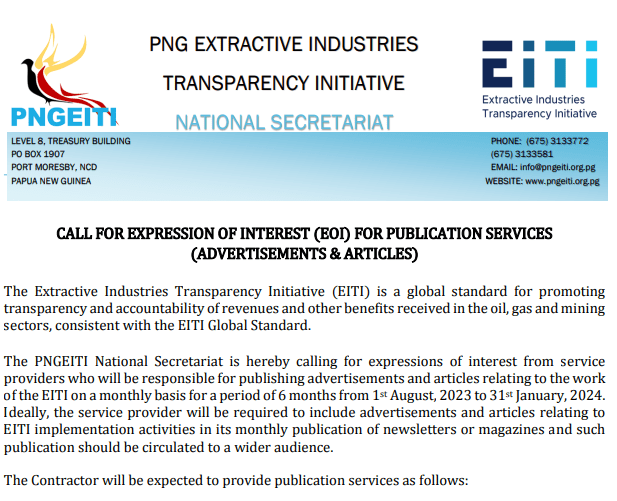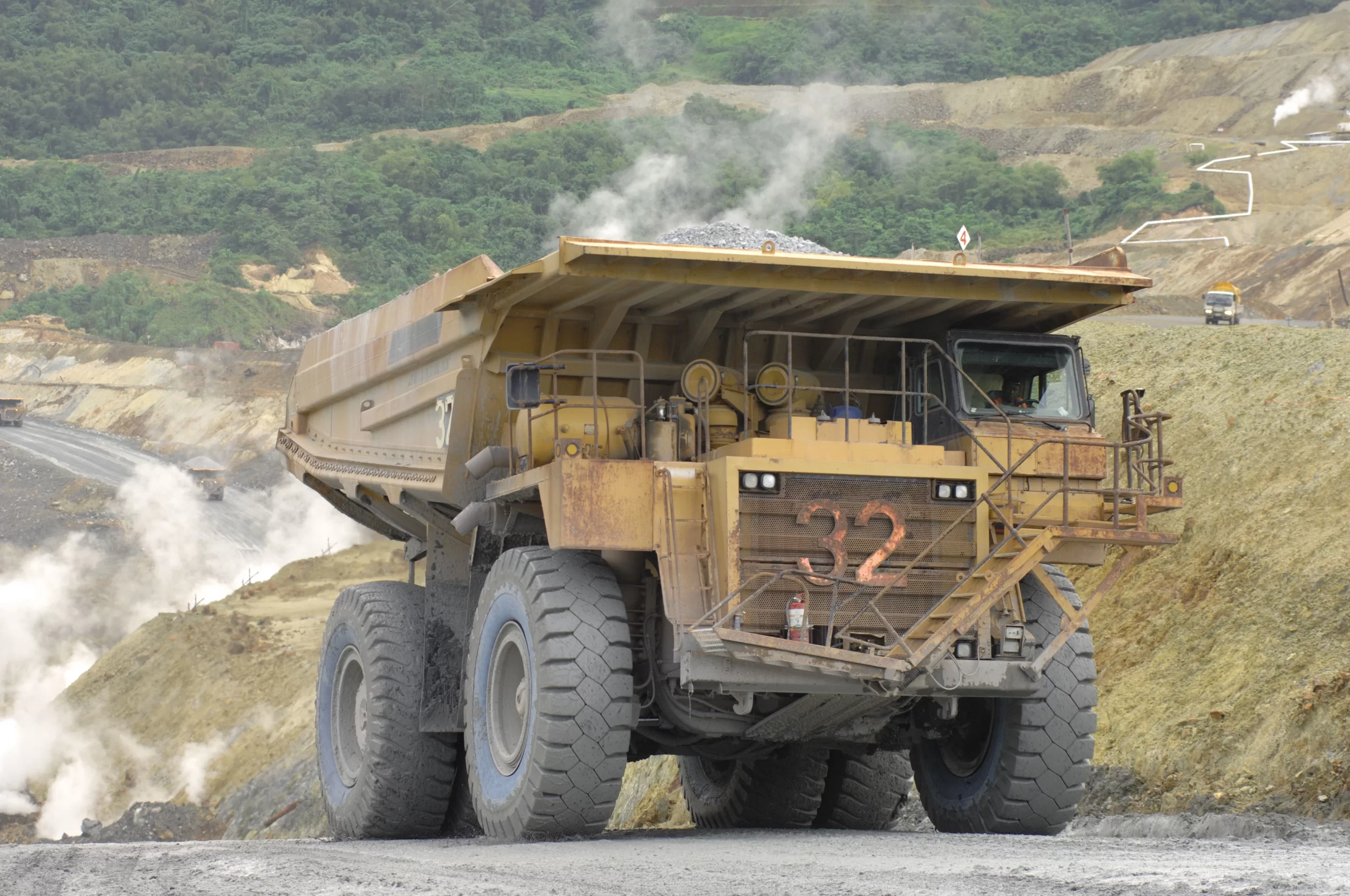improving extractives governance
PNGEITI Report Releases
The EITI holds all implementing countries to the same global standard. Through Validation, the EITI’s quality assurance mechanism, implementing countries are assessed on their ability to meet the provisions of the EITI Standard.

CALL FOR EXPRESSION OF INTEREST (EOI) FOR PUBLICATION SERVICES (ADVERTISEMENTS & ARTICLES)
The Extractive Industries Transparency Initiative (EITI) is a global standard for promoting transparency and accountability of revenues and other benefits received in the oil, gas and mining sectors, consistent with the EITI Global Standard. The PNGEITI National Secretariat is hereby calling for expressions of interest from service providers who will be responsible for publishing advertisements and articles relating to the work of the EITI on a monthly basis for a period of 6 months from 1st August, 2023 to 31st January, 2024. Ideally, the service provider will be required to include advertisements and articles relating to EITI implementation activities in its monthly publication of newsletters or magazines and such publication should be circulated to a wider audience. The Contractor will be expected to provide publication services as follows: Advertisements: This is to promote the work the PNGEITI National Secretariat and its MultiStakeholder Group (MSG) in terms of EITI implementation in country. The National Secretariat intends to place advertisements with a feature report in the publisher’s monthly publication of its magazines or newsletters. The advertisements will be prepared by the National Secretariat and submitted to the publisher (contractor) on a monthly basis. Articles: To place articles on EITI implementation activities to promote and create awareness in the publisher’s monthly magazine for the 6 months duration. These articles will cover new EITI initiatives, the validation exercises and the new requirements of the EITI Standard. It will also cover in country activities undertaken by the National Secretariat and its MSG. Interested bidders should obtain a copy of the Terms of Reference (ToR) from the Secretariat office or download it from link provided below. The Terms of Reference (ToR) provides full details on the scope of work involved. Submissions including a financial proposal for the publication services can be emailed to Francis_Diakon@treasury.gov.pg or delivered to the Secretariat office at Level 8 of The Treasury Building no later than 4:30 pm on the 31st of July, 2023. Terms of Reference (TOR) can be downloaded here TOR for PNGEITI publication services Download Preview Authorised by: Lucas Alkan Head of National Secretariat

CALL FOR EXPRESSION OF INTEREST (EOI) FOR PREPARATION OF THE FY2022 EITI REPORT
The Extractive Industries Transparency Initiative (EITI) is a global standard for the good governance of oil, gas and mineral resources. As a EITI country, PNG is required to publish this annual EITI report that contains all revenues received by the Government and all material payments made by industry companies, and the reconciliation of these payments and receipts. PNG has published 9 EITI Reports in strict compliance with the requirements of the EITI Global Standard since it became a EITI member country in 2014.

Call for Expression of Interest for Short Term Legal Consultant to Finalise the Proposed PNGEITI Commission Bill for Statutory Approval and Enactment
The Extractive Industries Transparency Initiative (EITI) is a global standard that seeks to promote open and accountable management of revenues generated from the non-renewable extractive sector (oil, gas and mining) activities. It also seeks to strengthen government and company systems and processes, inform public debate and enhance trust among different stakeholders.

PUBLICATION OF THE 8TH & 9TH PAPUA NEW GUINEA EXTRACTIVE INDUSTRIES TRANSPARENCY INITIATIVE REPORTS FOR FINANCIAL YEARS 2020 AND 2121 RESPECTIVELY
The Papua New Guinea Extractive Industries Transparency Initiative (PNGEITI) today (31st March, 2023) announces the publication of two flagship reports covering the fiscal years 2020 and 2021 for the extractive sector.

PNGEITI POSITION ON PORGERA MINE LEGACY TAX ISSUES.
The PNGEITI Head of Secretariat Mr. Lucas Alkan says all parties to the Pogera Mine must adhere to rules governing the extractive industry, particularly when dealing with fiscal matters that must be administered and observed according to law. His comments follow a news article on The National citing the Internal Revenue Commission (IRC) that unmet tax obligations of the Pogera mine stood in the way to expedite the mine re-opening process. Mr. Alkan says a workable and timely strategy that does not impinge on basic laws is a way forward. Below is the full comment on this issue. “The Papua New Guinea Extractive Industries Transparency Initiative (PNGEITI) commends The National newspaper for attempting to bring to light what appears to be the final outstanding issue (among others) in the Porgera Mine recommencement negotiations (more on this in footnote). We’ve noted from the reporting that taxation matters are legacy issues that appear to be standing in the way for the multi-million-kina Porgera Gold Mine to re-open. We have observed that the Government was on track to conclude negotiations and re-open the Mine by June last year, however this did not eventuate as anticipated. Attempts to reopening the Mine in the second half of last year was not feasible due to the national general elections and the formation of government. It appeared that all negotiations were concluded and a new Porgera Mining Agreement Framework was in place for the Mine to be re-opened in the first quarter of this year. Surprisingly, we learn that an old Porgera Tax liability dispute is standing in the way for the Mine to be re-opened. The early recommencement of the Mine, preferably within the first quarter of this year is critical for the country as the lead time required for mobilizing resources and the significant start-up capital needed to get the mine back into its full operating capacity would be a significant challenge. On this, we are aware there are also discussions going on with the developer and the government as to who is going to meet the startup cost but we understand Barrick Niugini Limited might meet the full cost of starting up the Mine and government would refund later but unsure as to whether this understanding has been reached or not yet. With regards to the current standoff, the EITI based on its global best practice principles is of the view that the existing law governing taxation matters must dictate or take precedence over any political intervention. We do not know the specifics of the on-going tax matter but understand that it is related to a tax dispute concerning the ‘old Porgera Mine’. If it is a significant amount of tax owed by Barrick to the Government based IRC’s audit in 2013 then it is a legal tax obligation that Barrick and its joint venture partners need to settle as required by law. We fail to understand as to why the old Porgera tax obligation/liability clause was inserted into the new Porgera Mining Framework Agreement making it a condition to resolve this legacy tax issue before reopening the Mine. If whatever was reported and commented by PM Marape recently is true then Barrick Niugini Limited and the State need to speed up the negotiation process and resolve this dispute immediately. Both parties should exercise good faith – Barrick Niugini Limited should not pull strings on this old Porgera tax liability matter and delay the re-opening of the Mine. It is understood the State (IRC) may not easily forego if there is a substantial amount of tax liability to be paid by the operator. Whatever the parties decide to do, they should resolve the tax liability issue through the due process of law but allow the Mine to re-open immediately under the New Porgera Framework Agreement. Political intervention is not recommended to resolve this dispute as this can undermine investor confidence, set bad precedence for the Government and create an uneven playing field for project developers. Barrack Niugini Limited should not put undue pressure on the State to resolve this matter politically in order to re-open the mine as it is not a best business practice. All stakeholders and the citizens have the right to know the specific issues or the nature of this tax liability issue between Barrick Niugini Limited (BNL) and the Internal Revenue Commission (IRC) as the continued delay in re-opening the Mine continues to have negative consequences on the economy. The prolonged delay has not only resulted in significant revenue loss to the Government (including the provincial and local level governments in the impacted resource area) but also loss of employment, business opportunities and spin-off benefits to the landowners and the wider communities. The shutting down of the Mine 3 years ago has had significant negative consequences on the economy including the current foreign exchange shortage that has constrained business operations in the other sectors of the economy. Porgera Mine had been a good source of foreign exchange inflows and its continued shutdown will definitely not going to contribute to the 4% economic growth (that was largely to be driven by the extractive sector) projected for by the World Bank for last year and the real GDP growth of 4% projected for this year in the 2023 National Budget. PNGEITI commends the transparent negotiation process to date that took substantial amount of time and effort to ensure the interests of all parties were reflected in those agreements. We encourage all parties to continue to respect and observe the laws of the land in this dispute resolution process to address the tax liability issue. We believe that a win-win situation for both parties (Government and Barrick) is to re-open the mine first and work together to resolve the outstanding tax liability dispute later going forward. ENDS. Note: This article was initially written for The National newspaper as response note to media query.

PNGEITI Calls for Transparency in the Sovereign Wealth Fund Arrangement
November 18. 2022 PNGEITI calls for Transparency mechanisms to be built into the Sovereign Fund Wealth Arrangement Transparency mechanisms built into the topical Papua New Guinea Sovereign Wealth Fund (SFW) will enable an effective functioning of the fund, according to the PNG Extractive Industries Transparency Initiative. PNGEITI welcomed the announcement of an initial injection of K5.6 million into the fund making it operational more than five years after the enactment of its enabling legislation. However, the PNGEITI raised concern over the lack of transparency around the operational and structural se-up of the fund. “While PNGEITI commends the operationalization of the fund, the status quo raises transparency questions that needs to be answered by way of building in transparency mechanisms into the SWF arrangement” Head of PNGEITI National Secretariat Mr Lucas Alkan said. “The PNGEITI which has been implementing the global best practice standard on transparency around revenues generated from the mining and petroleum sectors of the economy strongly holds the view that international best practice standard is also built into the SWF arrangement for better governance of the SWF operation, derived from the Santiago principles to be adhered to,” Mr. Lucas Alkan said. “One of the key objectives for SWF under the Santiago principle underpins a transparent and sound governance structure that provides for adequate operational controls, risks management and accountability- PNGEITI strongly encourages that this objective be fully met in the PNG SWF set-up. “SWF are regarded as important players in the international monetary system and for Papua New Guinea to have one requires due diligence in ensuring the fund stands out well in the international monetary system and is credible” Mr Alkan commented. “Consistent with the Santiago principles, the PNG SWF must bear economic and financial benefits for Papua New Guinea and the international financial system. “We welcome the first SWF payment and hope to capture more payments and distributions of funds in the EITI Reports, particularly those taken from our lucrative extractive industry. While commenting on the Government’s effort to operationalise the long-awaited SWF which is a positive step Mr Alkan said the Government needed to seriously conclude its pending dividend policy review and address the current parallel arrangements or set ups through the Kumul entities that have been empowered through their respective boards as to how much windfall revenues from the extractive sector could be paid to the Treasury or the SWF. He said to ensure the SWF operates on a strong financial footing to perform what it was set up to do, it needs to have access to all the windfalls that come out from extractive sector. “The opportunity cost of parking such funds (which may be significant in the long run when commodity prices are good) in entities of State that are playing duplicate functions will not assist in using such windfalls to pay down current high levels of public debt. We would be better off using the windfalls to pay off current high levels of debt than parking money in such arrangements that may be tempted to use for other purpose than what was intended for originally. Therefore, transparency mechanism is highly encouraged in the SWF set up”, Mr Alkan suggested. “We have had similar experiences in the 1980s and 1990s where the so-called commodity stabilisation funds that were established for similar purpose that never worked and we need to learn from these and ensure the SWF is properly established and operationalised,” Mr Alkan said. Photo caption: 2019 file photo – PNGEITI during a meeting with its stakeholders and international development partner.

